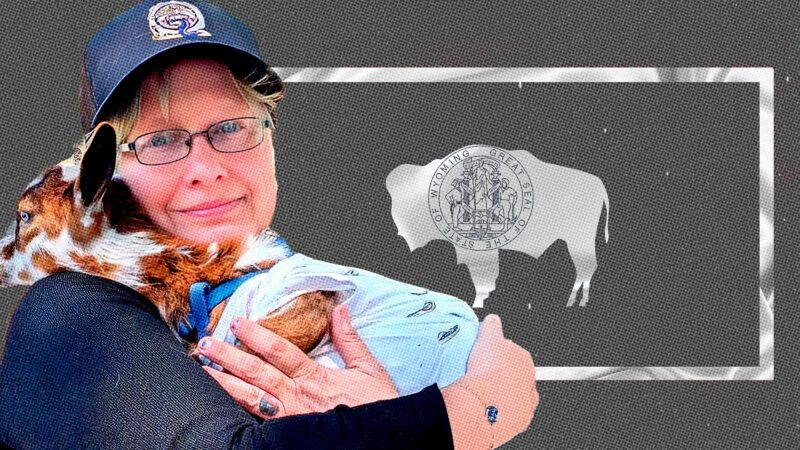Wyoming Woman Sues Her Town To Let Her Keep Her Pet Pygmy Goat
Venus Bontadelli thought she'd left the nanny state behind when she fled California. But her new home of Powell, Wyoming, wasn't as free as she'd hoped

When Venus Bontadelli and her husband moved to Powell, Wyoming, to be closer to family, they also hoped to find a reprieve from the "increasingly illiberal and imperious state of politics in California." But it seems this Wyoming town—with a population of roughly 6,500—isn't as "live and let live" as she hoped, but rather "exercise[s] shockingly broad power over the lives and property of citizens."
In December 2024, the family was gifted a baby Nigerian pygmy teacup dwarf goat—an increasingly popular choice of pet in the United States—named Porsche Lane. Porsche lived peacefully at the family's home until May 2025, when a Powell police officer arrived at Bontadelli's door to tell her that someone had complained about the then 10-pound, indoor-kept goat. The officer informed Bontadelli that she could keep Porsche, but only if she obtained an exotic pet permit. Since this encounter, the city has repeatedly and arbitrarily denied Bontadelli's permit, and Porsche has had to be removed from her family. Now Bontadelli is suing to bring the goat home and protect her and her family's right to due process of law.
Under Powell's city ordinance, a "household pet" is defined as "any trained or domesticated animal kept at a place of residence." Although Porsche is a breed of domesticated goat that, according to the complaint filed in federal court on Tuesday, typically stays under 20 pounds and has been bred in the United States for more than 50 years as a companion pet due to their gentle temperament, Powell excludes "goats" as a qualifying household pet. But the ordinance allows the city to "authorize in writing, the possession of specific…exotic animals" tailored to a "specific site" or address, provided that the "exotic animals are nonvenomous."
Even though Porsche is nonvenomous and requires less space and maintenance than a comparably sized dog, Bontadelli's request was denied. She was told it is because "goats" are listed as "livestock" animals under Wyoming state statute, and are excluded from Powell's definition of "household pet." Therefore, the rationale goes, Bontadelli's exotic pet application could not be granted unless the city's ordinance on household pets was changed, rendering her exotic pet application moot. (Wyoming also defines "pet" as "any domesticated animal normally maintained in or near the house of the owner.")
Bontadelli appealed to the city council, but her attempt was in vain. Despite explaining that her home is located on a sizeable lot "in a light industrial area" on the edge of town, and providing statements from her neighbors in favor of keeping Porsche as part of the neighborhood, the council made a final decision in July to deny her request. During the meeting, one councilmember conjectured that by providing Bontadelli an exception to keep her pygmy goat, "a herd of Nubians"—a much larger breed of goat, weighing between 100 and 250 pounds—would end up "running around town." Rather than risking a misdemeanor charge, punishable by fines and confiscation—and potential euthanization—of Porsche by city officials, Bontadelli opted to have her cherished pet cared for by the breeder until they can be reunited.
This is not the first time Powell's City Council has taken a hard line against granting residents exceptions around animal ownership. In 2020, the council declined to allow a family to keep a rooster under an exotic pet permit, claiming there was no route to grant variances. More recently, in 2023, the council rejected a bid to increase the number of chickens residents could own from four to six, even for residents with 10 acres of land. One councilmember stated that if the number of allotted chickens increased, "then pretty soon you've got somebody who wants to raise, well, pot-bellied pigs or dwarf goats or something…pretty soon you're living in the country."
But hypothetical scenarios of future applications should not factor into Bontadelli's application. The decision to reject her permit application, she argues, was based on the whims of the councilmembers, rather than on a legitimate government interest. Such "arbitrary" decision-making violates her right to due process under the 14th Amendment. Additionally, the complaint, which was filed by the Pacific Legal Foundation, a public interest law firm, alleges the council violated Bontadelli's right under the Wyoming constitution, which provides that "[a]bsolute, arbitrary power over the lives, liberty and property of freemen exists nowhere in a republic, not even in the largest majority."
In response to news of the lawsuit, Powell Mayor John Wetzel told the Powell Tribune that he's "sad it's come to this, but we do have to follow our ordinance[s] as they're written." He continued by saying, "I think we would have done more of a disservice to grant an exception, because that's not the way it works."
As ridiculous as this case may sound, it is not all that unusual. Bureaucrats across the country have meddled in people's harmless choices to raise pets—like the ones that famously murdered the internet sensation Peanut the Squirrel. If successful in her challenge, Bontadelli is seeking only $1 from the city and a declaration of Powell's ordinance as unconstitutional to stop the city's overreach into the lives of its residents.
As for Porsche, Bontadelli asks the court to deem the city's decision void so she can bring her pet home.


Show Comments (37)